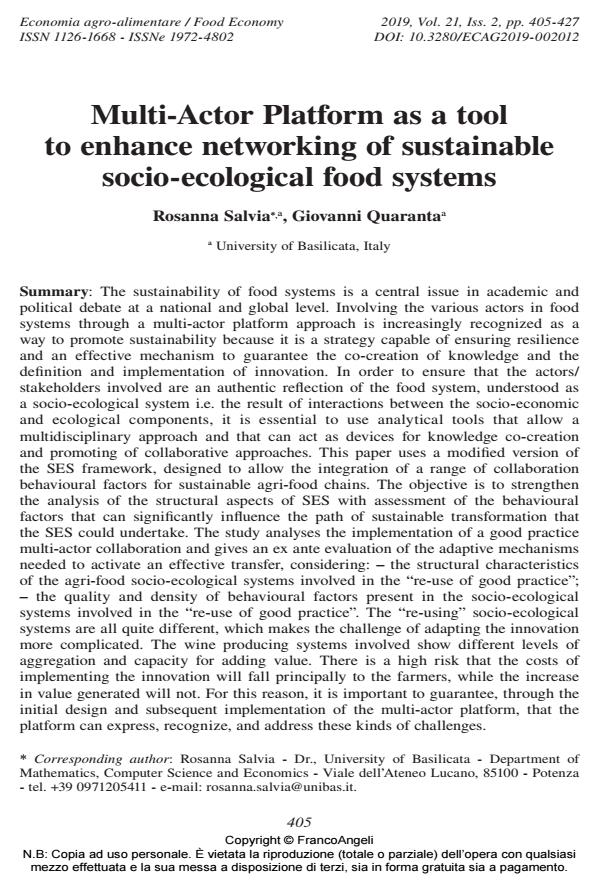Multi-Actor Platform as a tool to enhance networking of sustainable socio-ecological food systems
Titolo Rivista ECONOMIA AGRO-ALIMENTARE
Autori/Curatori Rosanna Salvia, Giovanni Quaranta
Anno di pubblicazione 2019 Fascicolo 2019/2
Lingua Inglese Numero pagine 23 P. 405-427 Dimensione file 191 KB
DOI 10.3280/ECAG2019-002012
Il DOI è il codice a barre della proprietà intellettuale: per saperne di più
clicca qui
Qui sotto puoi vedere in anteprima la prima pagina di questo articolo.
Se questo articolo ti interessa, lo puoi acquistare (e scaricare in formato pdf) seguendo le facili indicazioni per acquistare il download credit. Acquista Download Credits per scaricare questo Articolo in formato PDF

FrancoAngeli è membro della Publishers International Linking Association, Inc (PILA)associazione indipendente e non profit per facilitare (attraverso i servizi tecnologici implementati da CrossRef.org) l’accesso degli studiosi ai contenuti digitali nelle pubblicazioni professionali e scientifiche
The sustainability of food systems is a central issue in academic and political debate at a national and global level. Involving the various actors in food systems through a multi-actor platform approach is increasingly recognized as a way to promote sustainability because it is a strategy capable of ensuring resilience and an effective mechanism to guarantee the co-creation of knowledge and the definition and implementation of innovation. In order to ensure that the actors/ stakeholders involved are an authentic reflection of the food system, understood as a socio-ecological system i.e. the result of interactions between the socio-economic and ecological components, it is essential to use analytical tools that allow a multidisciplinary approach and that can act as devices for knowledge co-creation and promoting of collaborative approaches. This paper uses a modified version of the SES framework, designed to allow the integration of a range of collaboration behavioural factors for sustainable agri-food chains. The objective is to strengthen the analysis of the structural aspects of SES with assessment of the behavioural factors that can significantly influence the path of sustainable transformation that the SES could undertake. The study analyses the implementation of a good practice multi-actor collaboration and gives an ex ante evaluation of the adaptive mechanisms needed to activate an effective transfer, considering: - the structural characteristics of the agri-food socio-ecological systems involved in the "re-use of good practice"; - the quality and density of behavioural factors present in the socio-ecological systems involved in the "re-use of good practice". The "re-using" socio-ecological systems are all quite different, which makes the challenge of adapting the innovation more complicated. The wine producing systems involved show different levels of aggregation and capacity for adding value. There is a high risk that the costs of implementing the innovation will fall principally to the farmers, while the increase in value generated will not. For this reason, it is important to guarantee, through the initial design and subsequent implementation of the multi-actor platform, that the platform can express, recognize, and address these kinds of challenges.
Parole chiave:Multi-actor platform; wine sector; rural innovation; agri-food socialecological systems; networks.
Jel codes:Q13, Q18, Q56
- Innovation in Basilicata agriculture: From tradition to digital Maria Assunta D’Oronzio, Carmela Sica, in Economia agro-alimentare 2/2021 pp.1
DOI: 10.3280/ecag2-2021oa12210 - Assessing Young Consumers’ Responses to Sustainable Labels: Insights from a Factorial Experiment in Italy Carla Rossi, Francesca Rivetti, in Sustainability /2020 pp.10115
DOI: 10.3390/su122310115
Rosanna Salvia, Giovanni Quaranta, Multi-Actor Platform as a tool to enhance networking of sustainable socio-ecological food systems in "ECONOMIA AGRO-ALIMENTARE" 2/2019, pp 405-427, DOI: 10.3280/ECAG2019-002012